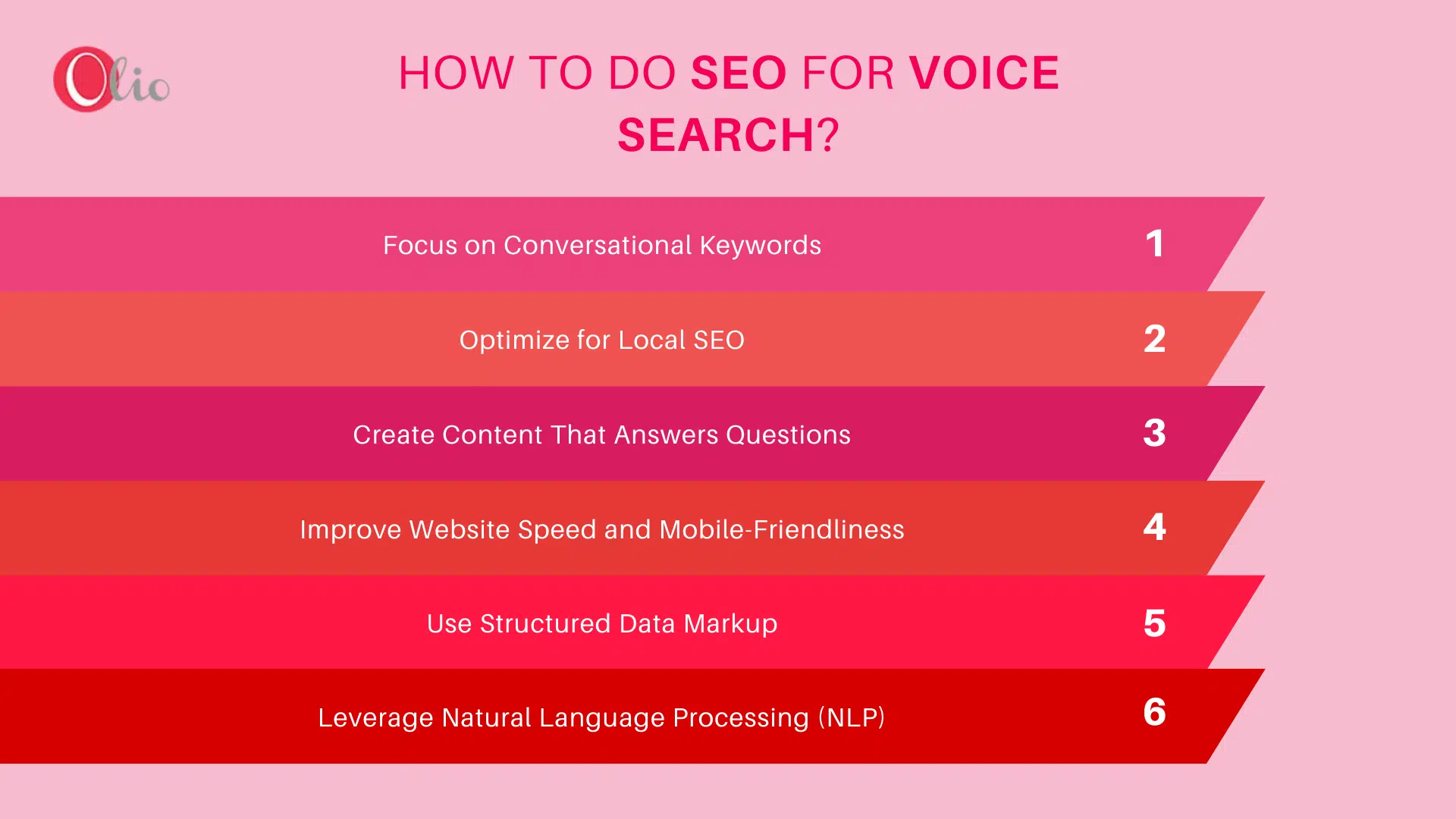Content
- Introduction
- Understanding Voice Search
- How Does Voice Search Differ from Traditional Search?
- Why Does Voice Search Matter for SEO?
- How to Optimize SEO for Voice Search?
- Challenges and Future of Voice Search
- Conclusion
Introduction
You’re making a cake, reading a recipe book, and you’re asked to add 5 tablespoons of sugar to it. You have a cup filled with sugar, and you need to understand how many tablespoons of sugar one cup is equivalent to. You cannot touch your phone as your hands are covered in flour, so you simply say, “Hey Google, how many tablespoons are in a cup?” Within seconds, you have your answer.
The things you ask the voice recognition tools like Siri, Google, or Alexa, are called Voice Search.
It’s 2025, and voice search has been around for quite a while now. Most SEO services in India, and worldwide, are already optimizing their content for voice searches for quite a while now. But today, it has become even more critical, as more than a quarter of global online searches happen through voice systems.
In this blog, we’ll explore the rise of voice search, how it differs from traditional search, and what you can do to optimize your SEO strategy for this growing trend. Let’s explore!
Understanding Voice Search
What is Voice Search?
Voice search allows users to perform searches by speaking into a device instead of typing. It uses speech recognition technology to convert spoken words into text, which is then processed by search engines. Popular voice assistants like Siri (Apple), Alexa (Amazon), and Google Assistant have made voice search a part of everyday life.
Why is Voice Search Growing?
Several factors are driving the adoption of voice search:
- Convenience: It’s faster and easier to speak than to type, especially when you’re multitasking or on the go.
- Improved Technology: Advances in natural language processing (NLP) and artificial intelligence (AI) have made voice assistants more accurate and responsive.
- Smart Devices: The widespread use of smartphones and smart speakers has made voice search accessible to millions of people.
How Does Voice Search Differ from Traditional Search?
Voice search isn’t just a new way to perform searches; it’s changing the way people search. Here’s how it differs from traditional text-based searches:
Search Query Differences
When people type a search, they often use short, fragmented phrases like “best SEO company in Mumbai.” But with voice search, queries are longer and more conversational.
For example, someone might say, “What’s the best SEO company in and around Mumbai?”
User Intent
Voice searches often have a stronger intent behind them. People use voice search for quick answers, local information, and immediate solutions. For example, “Where’s the nearest petrol pump?” or “How do I run ads on Google?”
Why Does Voice Search Matter for SEO?
If you’re not optimizing for voice search, you’re leaving money on the table. Here’s why it matters:
Growing Popularity
A study published on Statista says that 37% of people in India use voice to search for information on the internet and 20% of all voice search users use it for online navigation. In the USA.
Impact on Search Rankings
Voice search favors websites that provide quick and direct answers. If your content isn’t optimized for voice search, you’re less likely to appear in voice search results.
Opportunities for Businesses
Voice search opens up new ways to connect with customers. For example, local businesses can attract more foot traffic by optimizing for “near me” searches. E-commerce brands can use voice search to make shopping easier for customers.
How to Optimize SEO for Voice Search?
This is the obvious next question that comes to mind, “Okay, I’ve understood the importance of optimizing my content for voice search queries; but, how to do that?” Here is how:
Focus on Conversational Keywords
Voice searches are more conversational than text-based searches. Instead of targeting short keywords like “weather today,” focus on long-tail keywords and natural language phrases like “What’s the weather like today?”
- Use tools like AnswerThePublic or SEMrush to find question-based keywords.
- Incorporate these keywords naturally into your content.
Optimize for Local SEO
Many voice searches are local. For example, “Where’s the closest coffee shop?” To capture these queries:
- Claim and optimize your Google Business Profile listing.
- Include location-based keywords in your content (e.g., “coffee shop near Bandra, Mumbai”).
- Encourage customers to leave reviews, as these can improve your local rankings.
Create Content That Answers Questions
Voice search users often ask questions. To rank for these queries:
- Use an FAQ format on your website.
- Provide clear, concise answers to common questions.
- Aim for featured snippets (position zero), as these are often read aloud by voice assistants.
Improve Website Speed and Mobile-Friendliness
Voice searches are often performed on mobile devices, so your website needs to be fast and mobile-friendly.
- Harness platforms, such as PageSpeed Insights, to identify and fix performance issues.
- Ensure your website is responsive and easy to navigate on smaller screens.
Use Structured Data Markup
Structured data helps search engines understand your content. By adding schema markup to your website, you can increase your chances of appearing in voice search results.
- Use schema.org to find the right markup for your content.
- Also test schema markup using Google’s Structured Data Testing Tool.
Leverage Natural Language Processing (NLP)
Voice assistants rely on NLP to understand and respond to queries. To optimize for NLP:
- Write content that mimics how people speak.
- Use simple language.
- Avoid jargon and overly complex sentences
Challenges and Future of Voice Search
Current Challenges
While voice search offers many opportunities, it’s not without its challenges:
- Accuracy: Voice recognition technology isn’t perfect, and misunderstandings can occur.
- Privacy: Many users are concerned about how their data is being collected and used.
Future Trends
The future of voice search looks promising. Here are some trends to watch:
- Integration with AI and IoT: Voice search will become more integrated with AI and Internet of Things (IoT) devices, allowing for more personalized experiences.
- Expansion into New Industries: Voice search will play a bigger role in industries like healthcare, education, and retail.
Conclusion
Voice search has gone mainstream for quite a while now. That’s why SEO services in India and everywhere in the world need to optimize the content for voice searches with long-tail keywords.
Start by focusing on conversational keywords, optimizing for local SEO, and creating content that answers questions. Use tools like structured data and NLP to improve your chances of appearing in voice search results. And don’t forget to monitor your performance and adjust your strategy as needed.
If you need help getting started, contact the best SEO company in Mumbai.
Frequently Ask Questions
What Are Some of The Tools I Can Use for Optimizing My Content for SEO?
Here are some tools that you can use to optimize content for voice searches:
- AnswerThePublic: It helps you find question-based keywords.
- SEMrush: A comprehensive tool that also helps you analyze keywords, including long-tail keywords, and track your rankings.
- Google Search Console: It helps to optimize your website’s performance in search results.
- Schema.org: A great website tool to learn how to implement structured data.
How Do I List My Business or Content on Voice Searches?
You don’t register specifically for voice search. It’s the same process as traditional search. If your content provides a relevant answer to a user’s query, Google may include your page in search results, including voice search results. Optimizing for relevant conversational queries is key.
What Types of Content Should I Create for Voice Search?
Create content that directly answers specific questions. Provide comprehensive but concise answers to them in a structured way. Additionally, create Frequently Asked Questions (FAQs) and how-to guides type content as voice searches are usually about finding quick information on a topic or about how to solve a problem.
How Can I Identify Common Questions Related to My Topic?
Use tools like Google’s “People Also Ask,” section on the search queries, or go to Quora and Reddit platforms. You can also monitor social media to understand what questions your target audience is asking and go to AnswerThePublic type platforms to get a cluster of questions asked on the internet related to a specific topic.
What Type of Keywords Are Apt for Voice Search Optimization?
Focus on long-tail keywords, which are longer, more conversational phrases. Think about how someone would speak a query rather than type it. These often include question words (who, what, where, when, why, how). For example, instead of “SEO services,” target “What are the best SEO services for small businesses in Mumbai?”




















